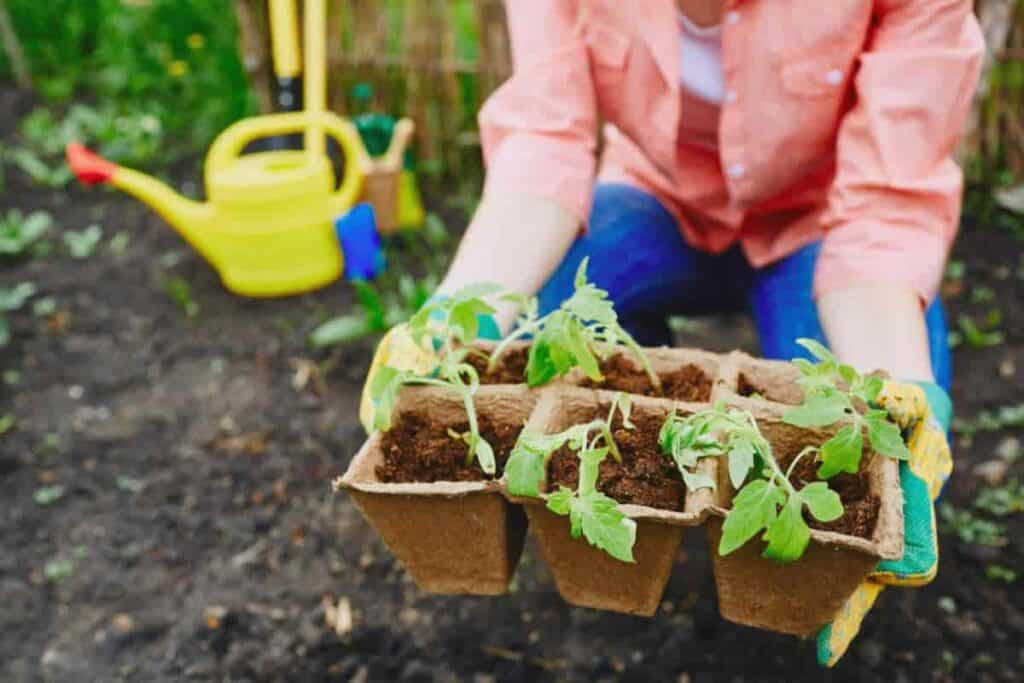The spring garden is coming along fast and needs immediate attention. Moisture is abundant, for the winter brought good seasoning weather throughout our area.

April activity centers around bedding plants, lawns, roses, and many other miscellaneous jobs.
Bedding Plants
This term is often taken to mean only annuals, but it rightly includes biennials and perennials, too.
The soil where these are to be planted was probably prepared last month and is ready for the new plants, but if not, dig it deeply now and add slow-acting fertilizers.
Before actual planting, try applying cottonseed meal at the rate of one gallon per 100 square feet and one-half gallon of sulfur to the same area.
Rake them lightly into the top layer of soil. Cottonseed meal stimulates quick growth and establishment of the new plant.
Effect of Sulfur
The sulfur causes a chemical breakdown of food elements in the soil into compounds available to the plants.
If you purchase bedding plants, try to get them in the pressed peat pots, popularly known as “Jiffy Pots.”
Although the plants may cost more, the time gained and the healthier plants make the extra cost worthwhile.
As the pot is made of peat moss, the roots may penetrate the sides and bottom without crowding, and there is no transplanting shock.
This guarantees a complete picture pattern when the garden is planted, which is so important in present-day gardens.
It also makes it possible to start plants later and hold them for late-season bloom, if desired.
Value of Pressed Peat Pots
For the average gardener, though, the greatest value in pressed peat pots is that they make it possible to get bedding plants established before the hot clays of June arrive.
Begin planting out verbenas, pinks, violas, petunias, late pansies, and other hardy annuals and perennial plants early this month. The more tender varieties can be planted later in the month and into May.
Good Lawns
Much has been said about the economy of good lawns, but actually good lawns are not to be thought of as inexpensive.
Well-maintained lawns are rather costly and usually show the results of money spent on them. Unfortunately, early this month, the lawn began to show foreign grasses and weeds.
Killing Bermudagrass Lawn
To kill them in a bermudagrass lawn, apply ammonium sulfate, four pounds to 100 square feet before the lawn actively grows.
Put it on while the grass is wet from heavy dew or watering. The concentration of salts in the foliage will kill the active plants which have appeared.
After this treatment, do not water the lawn with several clays, for the purpose is primarily to poison the foreigners and not to stimulate the lawn.
Of course, the fertilizer will eventually penetrate the soil and feed Bermuda’s early growth.
Burning of Bermuda Grass
Some burning of Bermuda may occur, but the good grass will recover rapidly as soon as warm growing weather comes.
April is also the time for grading and leveling lawn areas and repairing winter erosion.
All lawn grasses may be planted now and into May. Prepare the soil carefully and follow up with a regular program of feeding, mowing, and watering.
Garden For Roses
Vigorous growth begins in the rose garden now. But, unfortunately, many pests prey on early tender shoots.
Aphids cover the new shoots in clusters, doing damage quickly. However, malathion is still an effective control for them.
Spraying seems to be more effective here because our winds prevent effective dusting.
Spraying To Control Black Spots
Begin, too, the regular spraying to control black spots, the nemesis of all rose growers. Captan and its derivatives are still effective controls for this.
Practice disbudding side shoots of roses to encourage large exhibition blooms. Obtain rose show schedules and plan your entries now.
If you mount your roses, remove the earth from around them now, but avoid unnecessary cultivation.
Pruning of Roses
If pruning has not been completed, do it at once, and be sure to paint all wounds. Remove winter mulches from the perennial borders, being careful not to break new growth.
Choose a cloudy, quiet day. The bearded iris will respond to a cupful of granulated superphosphate worked around clumps now.
Rock Garden Plants
Rock garden plants can be planted now, and the rock garden structure can be repaired.
In the vegetable garden, plant onions, beets, carrots, peas, and greens, and add the tender vegetables at the end of the month.
Check your “acid-loving” plants and apply peat moss or chemicals to raise the acid content of their soil.
44659 by Robert H. Rucker
